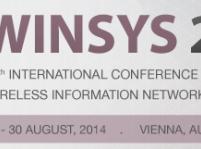| 主辦單位: | Vienna University of Technology |
| 承辦單位: | Institute for Systems and Technologies of Information, Control and Communication |
| 展會日期: | 2014-08-28至08-30 |
| 舉辦地址: | 奧地利 |
| 關注次數: | 0 |
| 官方網站: | http://www.winsys.icete.org/ |

The purpose of WINSYS 2014, the International Conference on Wireless Information Networks and Systems, is to bring together researchers, engineers and practitioners interested on information systems and applications in the context of wireless networks and mobile technologies.
Information systems and information technology are pervasive in the whole communications field, which is quite vast, encompassing a large number of research topics and applications: from practical issues to the more abstract theoretical aspects of communication; from low level protocols to high-level networking and applications; from wireless networking technologies to mobile information systems; many other topics are included in the scope of WINSYS.
Ideas on how to analyze and approach problems by combining information systems and communication technologies, either in the scope of R&D projects, engineering or business applications, are welcome. Papers describing new methods or technologies, advanced prototypes, systems, tools and techniques and general survey papers indicating future directions are also encouraged. Papers describing original work are invited in any of the areas listed below. Accepted papers, presented at the conference by one of the authors, will be published in the Proceedings of WINSYS, with an ISBN. Acceptance will be based on quality, relevance and originality. Both full research reports and work-in-progress reports are welcome. There will be both oral and poster sessions.
The best papers will be selected to appear either in an international journal or in a book to be published by Springer-Verlag.
Special sessions, case-studies and tutorials dedicated to technical/scientific topics related to the main conference are also envisaged: researchers interested in organizing a special session, or companies interested in presenting their products/methodologies or researchers interested in holding a tutorial are invited to contact the conference secretariat.
征文范圍及要求:
Each of these topic areas is expanded below but the sub-topics list is not exhaustive. Papers may address one or more of the listed sub-topics, although authors should not feel limited by them. Unlisted but related sub-topics are also acceptable, provided they fit in one of the following main topic areas:
1. SENSOR, MESH AND AD HOC COMMUNICATIONS AND NETWORKS
2. WIRELESS AND MOBILE TECHNOLOGIES
3. MOBILE SOFTWARE AND SERVICES
AREA 1: SENSOR, MESH AND AD HOC COMMUNICATIONS AND NETWORKS
Home area networks
Vehicular Networks
Ad Hoc Networks of Autonomous Intelligent Systems
Delay-Tolerant Networking
Pervasive Education Systems
Hybrid Wireless Communication Systems
Autonomic Networking
Body-based Wireless Networks
Coverage, Connectivity and Deployment Issues
e-Health Networking
Emergency Wireless Communications
Hardware and Software Platforms, Middleware
Local Dependent Networks
Localization and Positioning Schemes
MAC Issues in WSN
Measurements and Experimental Research
Mobile Ad Hoc Networks and Multi-Hop Wireless
Modeling, Algorithms, and Performance Evaluation
Novel Sensing Applications
Radio Issues in Wireless Sensor Networks
Ultra-Wideband and Short-Range Networks
Urban Sensing
Wireless Real-Time Communications
AREA 2: WIRELESS AND MOBILE TECHNOLOGIES
Performance Analysis of Wireless Networks
Spread-spectrum and CDMA Systems
Detection, Decoding and Diversity Techniques
Channel Coding, Modulation and Multi-user Detection
MIMO Systems and Techniques
Wired to Wireless transition issues
RFID Systems
Spectrum Policies and Open Spectrum
Energy Efficiency and Power Control
OFDM and Multi-Carrier Systems
Information Ubiquity
Cognitive Radio and Software Defined Radio
Cross-layer Design and Physical Layer based Network Issues
Directional and Smart Antennas for Sensor Networks
Radio Issues in Wireless Mobile Ad-hoc and Sensor Networks
Wireless Network Co-Existence
Wireless Multiple Access Techniques
Wireless Communication Middleware
Wireless Positioning Technologies
Wireless Multimedia
Enabling Technologies
Antennas and Propagation, Channel Modelling and Estimation
Cooperative Mobile Systems
Fault-Tolerance and Traffic Reliability Issues
Green Wireless Systems
High Altitude Platforms and Satellites
Network Measurement, Validation and Verification Schemes
Reconfigurable Wireless Networks
Routing Protocols, Qos, Scheduling and Congestion Control
Survivability, Network Management and Fault Tolerance in Mobile Environments
WiMAX, LTE, WMANs, and New Emerging Broadband Wireless Networks
Wireless Networks for Underwater and UAVs Communications
QoE management in Wireless Multimedia Networks
Social networking communication services
AREA 3: MOBILE SOFTWARE AND SERVICES
Web Services
Radio Resource Management
Wireless Application Areas
Information Security Policy for Wireless Networks
Wireless Information Policy, Risk Assessment and Management
Intelligent Living Environments: Architecture, Protocols and Applications
Network Traffic Analysis Schemes
Geographic Information and Location-based Applications and Services
Ubiquitous Wireless Services and Protocols
Convergence and Social Mobility
Localization Techniques
Charging, Pricing, and Business Schemes
Peer-to-Peer Computing and Networking
Multimedia and QoS over Wireless Networks



